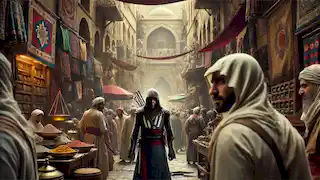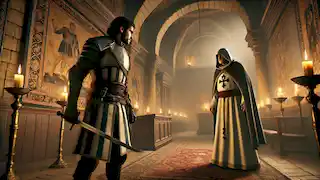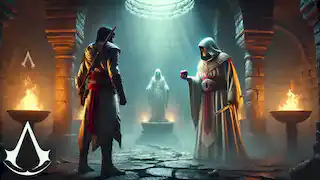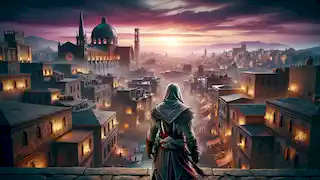In a world where shadows conceal secrets and ancient orders shape the course of history, one man's journey would alter the fate of nations. Born into a bloodline that stretches back for centuries, Altair Ibn-La'Ahad is an assassin—skilled, silent, deadly. His creed? To safeguard freedom and maintain balance. But as the lines between right and wrong blur, Altair must confront not only external threats but also his own understanding of loyalty, justice, and the true meaning of freedom.
The year was 1191. The Third Crusade ravaged the Holy Land, and while armies clashed over territories and faith, another war was waged in the shadows. A war of ideologies, fought between two secretive factions: the Assassins, who believed in free will, and the Templars, who sought to impose order through control. In the heart of this conflict stood Altair, a man whose legacy would ripple through generations.
From a young age, Altair had been trained in the ways of the Assassin Brotherhood. His mind, sharp as a blade, absorbed their teachings, and his hands, swift and silent, mastered the art of death. But for all his skill, Altair was not without flaws. Arrogance and impatience often clouded his judgment, leading to a fateful mistake that would change his life forever.
It was on a mission to retrieve an ancient artifact that Altair's overconfidence got the better of him. Tasked with eliminating a high-ranking Templar, Altair chose to disregard the Assassin's creed—his creed—and confronted the enemy head-on. The result was a disaster. His failure endangered the lives of his comrades and allowed the Templar to escape with the artifact. For his transgressions, Altair was stripped of his rank and forced to start anew, humbled, and broken.
But redemption was not out of reach.
The Assassin Mentor, Al Mualim, believed that Altair could still prove himself worthy. He gave the young assassin a second chance—to regain his lost honor by eliminating nine key targets, each of them instrumental in the Templars' schemes. Only by completing these missions could Altair restore his standing within the Brotherhood and uncover the Templars' ultimate plan.
Each target represented not just an enemy but a test. A test of Altair's skill, resolve, and understanding of the Creed. His journey would take him to cities like Acre, Jerusalem, and Damascus, each vibrant and bustling, filled with life, but hiding dangers in every corner. In these cities, Altair's blade would strike from the shadows, his silent footsteps bringing death to those who sought to enslave the world.

Altair’s first target was Tamir, a corrupt merchant who profited from war, exploiting the poor and desperate. Hidden among the crowd, Altair stalked Tamir through the narrow alleys of Damascus. The air was thick with the smell of spices and sweat as Altair moved with practiced ease, blending into the sea of people. When the moment came, it was swift and decisive—a flick of the wrist, and Tamir fell, his life extinguished before he could draw his last breath. But with each kill, Altair found that the world was more complex than he had been led to believe.
The next targets followed swiftly: Garnier de Naplouse, the head of the Knights Hospitalier, whose methods of healing the sick were anything but humane. In Jerusalem, Altair eliminated Talal, a human trafficker whose cruelty knew no bounds. Then there was Abu'l Nuqoud, a corrupt nobleman in Acre, who lived in opulence while his people starved. With each death, Altair gathered more pieces of the puzzle, realizing that the Templars' plans went far beyond personal greed or power.
The Templars sought the Apple of Eden, a powerful relic said to grant control over men's minds. With it, they intended to impose their vision of order upon the world, stripping away free will in the name of peace. Altair began to question the Assassins' methods and beliefs. Was he, too, just another pawn in this endless cycle of violence? Was freedom truly worth the cost of so many lives?
As the bodies of his targets fell, Altair's understanding of the Assassin's Creed deepened. The Creed was not just a set of rules but a philosophy—a way of seeing the world. “Nothing is true, everything is permitted” did not mean that life was without meaning or consequence. It was a reminder that the world is not black and white, that freedom and control are two sides of the same coin.
Altair’s journey culminated in the final confrontation with Robert de Sablé, the Grand Master of the Templars. The battle was fierce, fought with both steel and wits. Robert, cunning and ruthless, revealed that the Templars had already infiltrated the highest echelons of power, manipulating kings and sultans alike. But it was not Robert who posed the greatest threat—it was Al Mualim himself.

The Mentor, the man Altair had trusted and followed without question, had been playing his own game all along. Al Mualim sought the Apple of Eden not to destroy it but to wield its power for himself. In his eyes, the Assassins were no different from the Templars. Both sought control, whether through freedom or order. The realization was a bitter one, but Altair knew what had to be done.
Returning to Masyaf, the Assassins' fortress, Altair confronted Al Mualim in a final showdown. The Mentor, now corrupted by the power of the Apple, unleashed its illusions upon Altair. The world twisted and distorted around him, friends became foes, and nothing was as it seemed. But Altair, with the clarity and discipline honed through years of training, saw through the lies.
The battle was not just physical but philosophical. Al Mualim argued that humanity needed to be controlled, that left to their own devices, men would tear the world apart. Altair, however, believed in the right to choose, even if that choice led to chaos. In the end, Altair’s blade found its mark, and Al Mualim fell, leaving the Apple in Altair’s hands.

With the Apple, Altair held the power to reshape the world. He could control the minds of kings and peasants alike, impose peace, end war, and bring about an age of order. But to do so would go against everything he had come to believe. The Assassin’s Creed was not about control but freedom—the freedom to choose one's path, even if that path led to destruction.
Altair chose to hide the Apple, to keep it from the hands of those who would use it for their own ends. The Brotherhood would continue to fight in the shadows, preserving the balance between order and chaos. Altair, now a Mentor himself, vowed to lead the Assassins with wisdom and humility, to ensure that they never lost sight of their true purpose.
Years passed, and Altair’s name became legend. His actions shaped the course of history, but the struggle between Assassins and Templars never truly ended. The battle for free will raged on, carried by those who followed in his footsteps. Altair's legacy would endure through the ages, a reminder that in the eternal conflict between freedom and control, there are no easy answers.

As the sun set over Masyaf, Altair stood atop the fortress walls, looking out over the land he had fought to protect. The world was changing, and with it, the Assassins. But Altair knew that as long as men sought power over others, the Brotherhood would endure, a silent force in the shadows, guarding the flame of freedom.


















